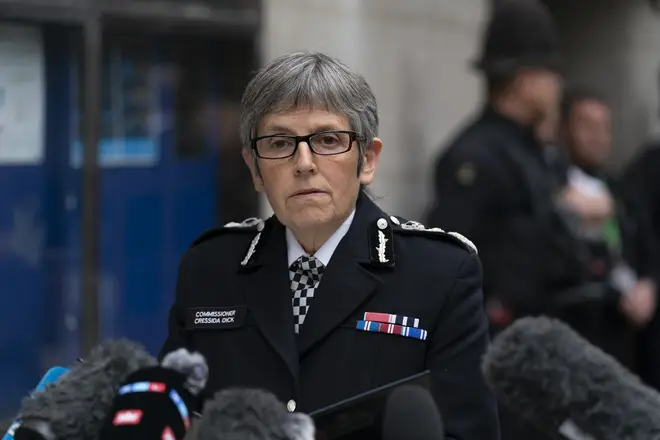
Oli Dugmore 4am - 7am
20 October 2021, 18:59

Dame Cressida Dick has admitted there are "challenges" around sexism in the Metropolitan Police, adding the force wants to bring those who fall below standards "to justice".
The Met Police chief gave evidence to the London Assembly Police and Crime Committee on Wednesday on the safety of women and girls in the capital, following the killing of Sarah Everard and Sabina Nessa.
When questioned about the issue of sexism within the force, Dame Cressida said: "I'm a realist. There's 44,000 people in the Met. We're drawn from society, which has challenges as we know around sexism.
"We must set higher standards, but there are occasions when people fall below those and we want to bring them to justice."
She told members of the committee that male violence against women is "far too common".
Read more: Police to review scale of drink spiking amid reports of women being injected at nightclubs
Read more: Plain-clothed Met cops to video call colleagues when stopping lone women

Plain clothes police officer to video call uniformed officers
The Met chief said the issue has been described by some people as "endemic" and said it is something everybody must get involved in tackling.
The commissioner added there is "no place in the Met for people who display racist, sexist, homophobic behaviour".
She also admitted the force has a "hill to climb" in order to regain the public's trust.
Following the murder of Sarah Everard, Baroness Casey of Blackstock will lead a review into the Metropolitan Police.
The review will scrutinise the force's vetting, recruitment, leadership, training and processes.
It is expected to take around six months, with the findings and recommendations published so that the force can "improve and make sure the public have more confidence" in police.
An "urgent examination" is also under way into all current investigations of sexual and domestic abuse allegations against Met police officers and staff.
Read more: Policing Minister: Cressida Dick is 'the right person for the job'
Meanwhile, at the Commons on Wednesday, Kit Malthouse suggested a "greater feminisation" of UK policing via the recruitment of more women as officers could help boost confidence in the police.
The Home Officer minister said more work needs to be done: "One of those processes, if you like, is what we're seeing at the moment with the uplift programme, which is a greater feminisation of UK policing.
"We've moved over the last 10 years from 25% of the force being female to just over a third, and we have a number of forces now that more than half of their new recruits are female.
"I hope that that progress will both mean women and girls feel the police force better reflects them and may result in better contemplation of these issues."

I've Been Spiked founder Mair Howells speaks to LBC's Shelagh Fogarty
The conversation around women's safety comes amid reports of terrifying incidents of people being "injected" with drugs at nightclubs across the country.
Priti Patel has now asked police to urgently assess the scale of drink spiking at nightclubs and parties following the reports.
The Home Secretary has asked forces for an update after some said they had seen more spiking incidents in recent months.
Mair Howells, founder of I've Been Spiked, told LBC that injecting women was particularly "terrifying" because there was "no way" to protect yourself.
She added that, because victims need to get tested so soon after the incident, there are likely many cases that are not reported.
"With spiking it's a massive grey area," she told LBC's Shelagh Fogarty.
Groups from more than 30 universities around the UK have joined an online campaign calling for the boycott of nightclubs, with campaigners seeking "tangible" changes to make them safer, such as covers/stoppers for drinks, better training for staff and more rigorous searches of clubbers.